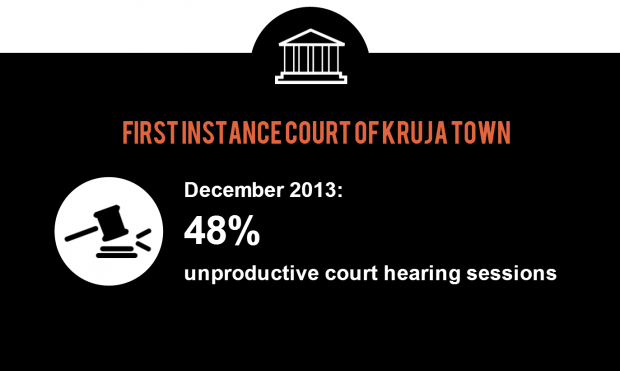Justice without delays in Kruja court
Justice sector reform sometimes focuses only on criminal justice, while civil and administrative proceedings are overlooked. This does not reflect the importance of solving civil disputes for the general prosperity and wellbeing of the people. This particularly applies in Albania, where numerous open property issues prevent important developments. Inheritance and child custody disputes are other examples that often have major importance for the persons involved. Settling such disputes, with finality and confidence, is important for all parties to move on with their lives.
However, in an analysis of civil proceedings in district courts, the OSCE Presence in Albania found that 47.7 per cent of the observed hearings were completely unproductive – no argument was put forward, no documents circulated, no evidence taken and no requests made. This represents a substantial waste of both the judges’ and parties’ time.
To improve the situation, the OSCE Presence and the USAID’s Albanian Justice Sector Strengthening Project (JuST) initiated a pilot project with the first instance court of Kruja town. The project is called to increase the efficiency and accessibility of trials, by fostering active trial management in particular. Since its launch, the High Council of Justice and the Ministry of Justice pledged support for this project and provided input and advice.
All four judges of the small Kruja district court are women. A survey of the court files showed that the percentage of unproductive sessions at the start of the project was as high as 48.8 per cent. The OSCE Presence and JuST Project prepared a baseline study based on the survey results and presented the findings and recommendations to the Kruja judges in a two-day workshop in December 2013. The judges immediately took ownership of the project and drafted a concrete action plan with a ‘Justice without delays’ motto. “It is in everybody’s interest that trials are not dragged on. Nobody has time to waste. When the court functions in a more effective way the citizens and the institutions will be the first to benefit,” says Kruja chief judge Alma Hoxha.
The action plan foresees that between February and July 2014 the court will reduce the number of civil and criminal hearings to a minimum by implementing active case management techniques, such as refusing late submission of evidence, clarifying the addresses of the parties in advance, making evidence available to parties before the hearing, and refusing unfounded requests to postpone trials. The judges engaged to reduce the average number of sessions from 14 to 4 in complex civil cases, and from 8.8 to 3 sessions in criminal cases.
Several months have passed since the launch of the pilot project, and the results are promising: the number of hearings in criminal cases has dropped from an average of 8.8 to 1.8 by the end of March 2014, whereas non-complex civil cases are now completed in 2.4 sessions. The number of cases handled by the four Kruja judges in February-March 2014 increased by 40 cases, compared to the same period in 2013, when six judges worked with the Kruja court.
The interim results of the pilot project were presented at a high-level meeting that took place in Tirana on 9 April 2014, which was attended by top representatives of the Albanian judicial system, the OSCE Presence and the United States.
“We are all very proud of the Kruja Court, which is a small court setting a big example in the country. Such a project cannot be a one-man show, or rather a one-woman show, in this case. I like to repeat a very nice proverb: ‘If you want to go fast, go alone. If you want to go far, go together’. We are not trying to change court practice in a day – we want lasting change, therefore, we must go together. The contribution of each judge, prosecutor, lawyer, police officer and state representative is necessary to deliver efficient and effective justice to all Albanian citizens.”
Ambassador Florian Raunig, Head of OSCE Presence in Albania
Based on the initial results of the Kruja court, the OSCE Presence in Albania and the JuST project have decided to expand the pilot project to a bigger court, the first-instance district court in Korça, which is composed of 18 judges.




